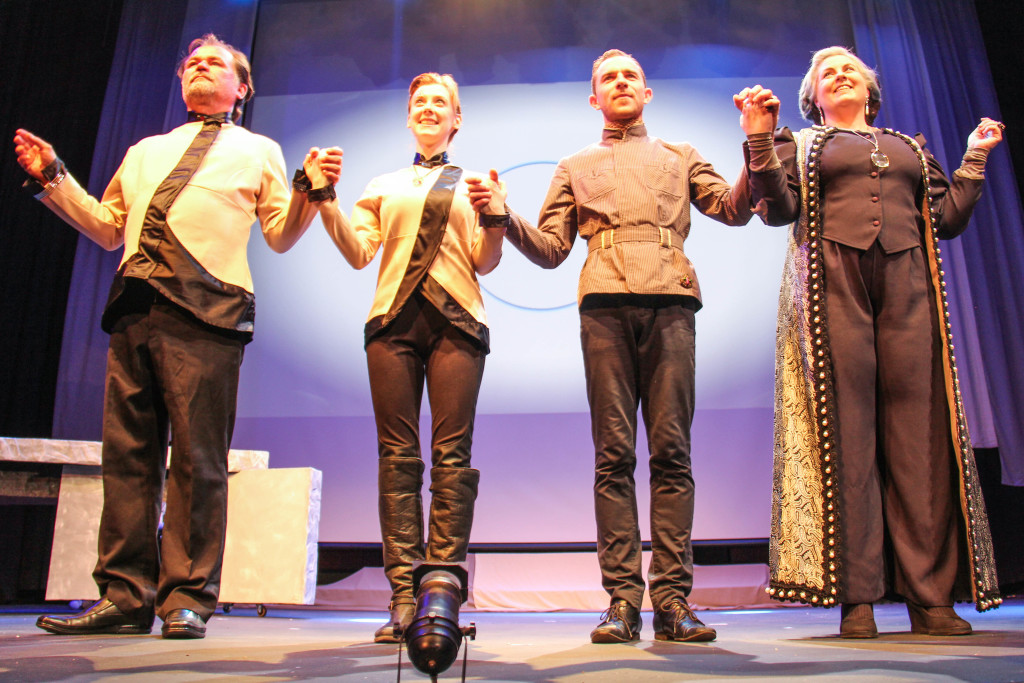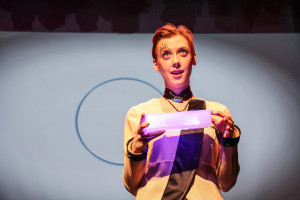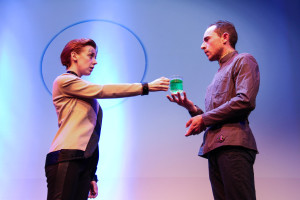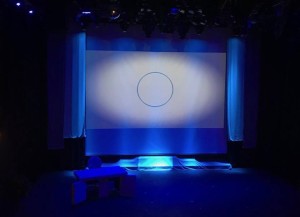
THEATRE REVIEW BY RORY ANDREWS
Tribe of One is an incredibly ambitious play for a number of reasons. First off, it’s science fiction, on a stage, in Cape Breton. This is not low sci-fi either. The story, themes, and tone hearken back to the short stories of Bradbury, Azimov, or Vonnegut, that littered the pages of anthologies in the 1960’s. In short, this is not a Rogers and Hammerstien musical revamp from the 1950’s. This is an intimate story, set in a strange world, about what it means to be moral and good, and if these two things are synonymous at all.
The second reason Tribe of One is a particularly ambitious play is because the main character is a genetically engineered, unfeeling sociopath. Usually when it comes to theatre, directors and playwrights work hard to create an empathetic protagonist that the audience can relate to. This is thrown aside by the fact that our main character, Del, is incapable of empathy itself. It doesn’t hurt, however, that Del is played by Hilary Scott, whose stage presence is nearly instantaneously like-able. Make no mistake though: she’s cold.

A note on psychopaths. Many people mistake psychopathy with evil, or madness, when in reality, the condition is neither of those things. Psychopaths are emotionally crippled by an inability to feel empathy. It is more of a mental handicap than a conscious will towards evil, and because psychopaths have never felt empathy, like a blind man having never seen light, they have no concept of what it is or feels like, and might not even register its absence. You might be a psychopath yourself and not even know it.
Also, psychopaths rarely become serial killers. Psychopaths make up about one percent of the general population, so if you have 500 Facebook friends, congratulations, approximately five of them are psychopaths, and there’s probably not one killer in the bunch. Psychopaths are, however, commonly cunning and manipulative, but scientists have found this to be beneficial to a population. To have certain members of your society have no moral compass, but the ability to retain relationships, can really come in handy in less savoury situations.
And that is exactly the setting in which we are introduced to Del. When it comes to science fiction, the setting is just as important as the characters, if not more so, and the slow reveal of this world, 450 years in the future, is skillfully revealed in Tribe of One. Earth has been ravaged by overpopulation and wars due to dwindling resources and a constant struggle to survive. Billions have died, and the few that remained built a new world upon the ashes. One that would never again be torn asunder by the selfish and illogical souls of human beings.

A world of logic, enforced by the unfeeling.
The rules of this world have already been written on a mysterious granite monument standing 20 feet tall in a field of Elbert County, Georgia. This aspect of the play is not fiction. The Georgia Guidestones is a mysterious monument, made of granite slabs weighing over 200,000 pounds, inscribed with 10 rules for humanity, written in 10 different languages. Nobody knows who designed the Guidestones, or the meaning behind them, but If you look closely at Del’s desk, you will see the resemblance. The play is littered with references to this mysterious monument that asks the world for logic, reason, and a population under 500,000.
But what would science fiction be without meaning? There is no reason to construct a world if you’re not going to use it to say something or explore ideas. What Tribe of One challenges us with is the paradox of what evils have to be perpetrated in order to create a moral and just society. Through flashbacks, we follow Del through her education (or conditioning) to prepare her to make large scale life and death decisions for the good of the world. Once you get past the retro-future aesthetic and compelling world, what your left with is a play about sacrifice, and what responsibility truly requires.
Because even while Del is conditioned to be uncaring and clinical, you will find yourself asking if she really is a psychopath or not. Del has a mother (Diana MacKinnon Furlong) that she wants to please, or at least not offend. She has a psychopathic teacher, played with equal parts nurture and academic pressure by Chris Corbett, who functions more as a father figure than an overbearing coach. But the highlight of the play had to be the small amount of warmth seen between Del and her subordinate played by Andy Gouthro.
I could watch Hilary Scott and Andy Gouthro scrape paint off the stage and be entertained. They are just plain fun to watch, and they are some of the best Cape Breton has to offer in stage-presence and talent. The highlight of the play just might be a scene with them eating ice cream, or some sort of future, space-ice cream.

Rounding out the cast is Sarah Blanchard playing a doctor who somehow symbolizes the entire remainder of humanity, living in fear and awe of psychopathic judges, juries, and executioners. Her performance gives weight to the rest of the world, and portrays this sterile future as the dark place that it truly is.
Tribe of One is a rare thing. The visuals come from a retro-future, Logan’s Run sci-fi design. The ideas come from some of the greatest authors of the mid-20th century. The performances are warm at the same time they are sterile, and it is one of the last things I anticipated to see on a stage in downtown Sydney.
It’s a bold move. A risk, but the Highland Arts Theatre is working, one small step at a time, to show that the range of modern theatre goes far beyond 70 year-old-musicals.
Tribe of One is playing at the Highland Arts Theatre, every Friday night at 8:00PM until August 11. Tickets are available at highlandartstheatre.com/.

